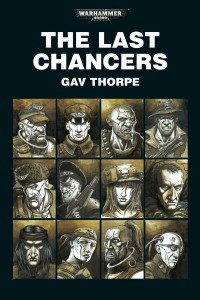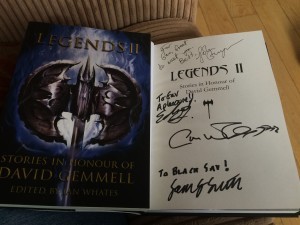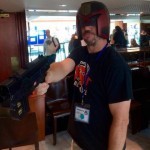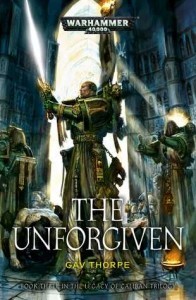Gav Thorpe's Blog, page 30
September 23, 2015
More Dark Angels Secrets Revealed!
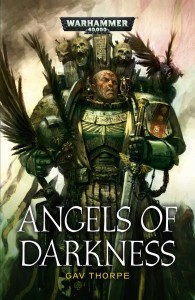 A while back (July, to be more specific) I asked folks to send in their questions about the Dark Angels Space Marines, both in the 40K timeline and the Horus Heresy. I answered some of those questions before and now I have found some time to address those that arrived via my Twitter feed.
A while back (July, to be more specific) I asked folks to send in their questions about the Dark Angels Space Marines, both in the 40K timeline and the Horus Heresy. I answered some of those questions before and now I have found some time to address those that arrived via my Twitter feed.
The following answers are purely my own – reasoning and thoughts I had while working on the novels and short stories. I have not worked in the Games Workshop Design Studio for many years and can’t comment on background directly related in the Codex or what the thought processes of the developers might have been while writing it. I can also only speculate about future plans and directions, even within the Horus Heresy, as ultimately the story is at the discretion of the developers and editors. What I would like to happen and what might actually happen may not be the same thing (though quite possibly they will be!).
Jamie Neil Saunders – Will we see clashes of philosophy and fighting styles within the Legion going forward? The widening of the rift that exists?
One of the issues I’ve been facing writing Angels of Caliban is that there have been successive authors working on the Dark Angels story and each of us has brought something different in terms of organisation, titles and so forth. The Dark Angels Legion as it stands at the outbreak of the war is a culmination of several iterations of structure (in-universe, that is) dating back to their formation as the first Space Marine army of the Emperor, through the application of the Legion ‘template’ and amalgamation with The Order on Caliban. It is, both in the realm of the Heresy and in terms of writing, an accreted hodge-podge of layers, ranks and organisation.
In Angels of Caliban I have sought to address, or at least touch upon, how the various factions within the Legion, be they Terran, Calibanite, Old Legion or New – revert to type. In some situations the more knightly structure is evident, in others the more Imperial organisation comes to the fore. For instance, the warriors left on Caliban under the direction of Luther are definitely moving back toward being The Order, something which is at the heart of the Caliban-based part of the novel and the tensions this creates. (Some of which is foreshadowed in my audio Master of the First)
Marcus Pitt – 1. What next for the DA in the Heresy? 2. Spoiler Question! Only click this link if you’ve read The Lion, or don’t mind spoilers.
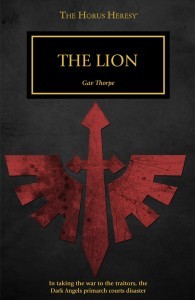 1. Well, at the outset of Angels of Caliban the Dark Angels are primarily in three places. On Caliban we have the reinforcements under Luther, with Astelan and Zahariel. The Lion has around thirty thousand legionnaires on the far side of the Ruinstorm with the Ultramarines and Blood Angels. The rest of the ‘active’ Legion is under the command of Corswain, engaged in a to-and-fro battle with Typhon and his Grave Wardens, whilst also under orders from his Primarch to locate Leman Russ if possible.
1. Well, at the outset of Angels of Caliban the Dark Angels are primarily in three places. On Caliban we have the reinforcements under Luther, with Astelan and Zahariel. The Lion has around thirty thousand legionnaires on the far side of the Ruinstorm with the Ultramarines and Blood Angels. The rest of the ‘active’ Legion is under the command of Corswain, engaged in a to-and-fro battle with Typhon and his Grave Wardens, whilst also under orders from his Primarch to locate Leman Russ if possible.
Angels of Caliban deals primarily with events on Caliban and around Macragge, although there is a small hint as to the fall-out from Corswain’s activities too. We’ll see what the Lion’s place is within Imperium Secundus, and continue to watch the unfolding events of Luther’s plans.
2. Marcus’ second question was a spoiler for The Lion. If you have read The Lion, or don’t mind spoilers, click this link to see the question and answer.
James Blacker – Will you include Epimetheus from Pandorax in your DA Heresy story arc?
It is something we are looking at, not quite sure how we can juggle everything into position but we’ll try – it might just be a cameo or reference that Dark Angels fans will recognise.
There were also several people that wanted to know more about the enigmatic warrior known as (Lord) Cypher…
Andrew Cattanach – Who is Cypher really? And because you won’t answer that, will we get to see more of the “legion building” rumours?
Richard August – How much can you/will you reveal about the knowledge and fate of The Fallen & Cypher?
Oli Colbourne-Laight – How did Cypher gain part of the sword of the lion?
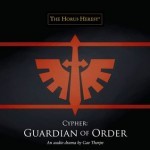 Clearly I don’t want to spoil the mystery of Cypher, and his identity and purpose is one of the great debating points among 40K fans. All I can say is that between the Legacy of Caliban tale and the ongoing arc in the Horus Heresy the tale of Cypher can be pieced together, even if there is never going to be a reveal of the whole picture.
Clearly I don’t want to spoil the mystery of Cypher, and his identity and purpose is one of the great debating points among 40K fans. All I can say is that between the Legacy of Caliban tale and the ongoing arc in the Horus Heresy the tale of Cypher can be pieced together, even if there is never going to be a reveal of the whole picture.
On the subject of ‘legion-building’ all I can say is that events during The Unforgiven may hint at an answer to that question.
And quite a lot of interest in the diminutive Watchers in the Dark…
Brent Buckland – Is it true that the Watchers in the Dark are the disembodied spirits of the squats of 40k past?
September 12, 2015
Asurmen: Hand of Asuryan
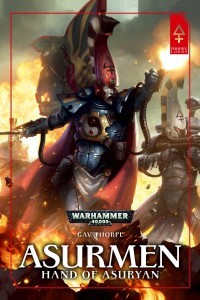 I wanted to write about the Phoenix Lords for several years, and started drip-feeding enthusiasm for the project to the editors at Black Library in 2012. It was great to write Karandras’ cameo appearance in Path of the Warrior, and it whetted my appetite for these legendary eldar warriors. Another part of the inspiration was the idea of having awesome covers by Neil Roberts of each of the Phoenix Lords, as he had done such a great job on my Path… series. Although Neil wasn’t commissioned for the covers in the end, I’m equally pleased with the cover by Nuala Kinrade.
I wanted to write about the Phoenix Lords for several years, and started drip-feeding enthusiasm for the project to the editors at Black Library in 2012. It was great to write Karandras’ cameo appearance in Path of the Warrior, and it whetted my appetite for these legendary eldar warriors. Another part of the inspiration was the idea of having awesome covers by Neil Roberts of each of the Phoenix Lords, as he had done such a great job on my Path… series. Although Neil wasn’t commissioned for the covers in the end, I’m equally pleased with the cover by Nuala Kinrade.
In 2014 I formally pitched the story which was to become Asurmen: Hand of Asuryan. The original idea was for a collaborative series with other authors, looking at each of the Phoenix Lords in turn, although I’m not sure if the rest of the series is still planned – I hope so, as I’d still love to write more about Karandras.
The first three reviews are now up, and each have been given an amazing five stars.
“…a fantastic novel of non-linear storytelling and highly memorable hero… a solid five star rating.” 5 stars
– Alexander Draganov, Goodreads
“An excellent tale about the greatest of Eldar warriors, with insights about his life before and during the Fall.” 5 stars
– Hakan, Goodreads
“It is extremely well written and well paced. and if there are any other books coming out (which I think there are) and they are written by Gav Thorpe, then I thoroughly look forward to reading them.” 5 stars
– Rob C, Amazon
You can read an extract via the Asurmen: Hand of Asuryan page.
There are only a handful of the special edition hardback books left, but the general release hardback and eBook are now available – full details can be found here.
Which Phoenix Lord would you like to read about next, and why?
If you’ve read Asurmen: Hand of Asuryan, I’d love to know what you thought of it. Please let me have details of any reviews you’ve written, or leave a message in the comments. Thanks.
**To make sure you don’t miss out on any blog posts, you can keep up-to-date with everything Gav by signing up to my monthly newsletter. As a bonus, every other month I randomly pick a newsletter subscriber to receive a free signed copy of one of my books.**
September 9, 2015
Hobby Games: The 100 Best
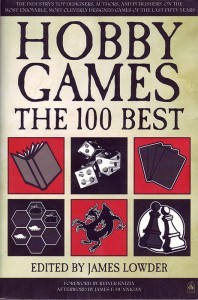 Back in 2007 I was honoured to contribute an essay to a book called Hobby Games: The 100 Best, alongside luminaries of the gaming world such as Steve Jackson, Richard Garfield, and Gary Gygax. Edited by James Lowder, the book has a forward by Reiner Knizia. My game of choice was Hammer of the Scots, a Columbia Games ‘block game’ covering the wars between the English and Scots.
Back in 2007 I was honoured to contribute an essay to a book called Hobby Games: The 100 Best, alongside luminaries of the gaming world such as Steve Jackson, Richard Garfield, and Gary Gygax. Edited by James Lowder, the book has a forward by Reiner Knizia. My game of choice was Hammer of the Scots, a Columbia Games ‘block game’ covering the wars between the English and Scots.
The book received the 2007 Origins Award for Non-Fiction Publication of the Year, and a silver award in the Best Regalia category (that is a book or product used to promote role play gameplay) at the 2008 ENnies.
“If you are looking for some inspiration on your next game purchase, then this is the book for you. If you are a games designer and want to know what the top designers believe are commendable games, then this book is for you. If you are interested in the history of the hobby game industry, then this book is for you, too. This is an excellent collection of essays that will provide readers with great insights into many of the top games and designers.”
– Serge Pierro, Game Nite Magazine
The book has just received a great review from Serge Pierro at Game Nite magazine (which you can read in full here). The magazine also contains many fascinating articles and game reviews, which are well worth a read.
Hobby Games: The 100 Best is available to purchase as an eBook, and you can find more information about it here.
And if you’ve read and enjoyed this book, there is a companion title called Family Games: The 100 Best, which includes my essay on the game Easter Island.
The book includes essays on games such as Dungeons & Dragons, Axis & Allies, and of course Warhammer 40,000. Which games would be your top picks and why?
**To make sure you don’t miss out on any blog posts, you can keep up-to-date with everything Gav by signing up to my monthly newsletter. As a bonus, every other month I randomly pick a newsletter subscriber to receive a free signed copy of one of my books.**
September 5, 2015
How to Write a Story
 A conversation I have had on and off for years with other writers revolves around a fairly simple premise: because people are taught how to functionally write at school they assume that they can be ‘a writer’. We have a self-awareness when it comes to painting, sculpting, other artistic forms. We know that our stick man does not put us in the same category as Rembrandt. (Usually, there are always exceptions…) This does not seem to apply to writing.
A conversation I have had on and off for years with other writers revolves around a fairly simple premise: because people are taught how to functionally write at school they assume that they can be ‘a writer’. We have a self-awareness when it comes to painting, sculpting, other artistic forms. We know that our stick man does not put us in the same category as Rembrandt. (Usually, there are always exceptions…) This does not seem to apply to writing.
I don’t read other people’s unpublished stuff very much at all, for a lot of reasons, but now and then I’ll get handed something at a convention or other event and I’ll take a look. Sometimes it’s good, often it’ll need work, sometimes it’s just a collection of words seemingly thrown semi-randomly at a page. It’s hard to give feedback on those ones because it boils down to, “Go away and read some books on sentence construction, basic grammar and narrative form.” I’ll usually pick on one thing, often a massively varying tense or perhaps an idiomatic approach to dialogue tags, and go with that.
In a way, that’s not the worst type of work to read. The one’s that can be really tricky to comment on are those that are competently or even well-written in a technical sense but, in any respect, are utterly lacking an actual story. These pieces proceed from one event to another, sometimes portrayed in entertaining fashion, but fundamentally do not contain a narrative. Nothing actually happens in any meaningful way.
So, I’m going to ask a few simple questions and you have to answer them about your story. The questions are the same, regardless of whether it’s a flash fiction piece or a multi-volume novel series. There are no correct answers, but there has to be some kind of answers.
What is the Story About?
Often when I ask this the answer starts something like, “Well, there’s the elf, right, and she’s going to be a princess except there’s a dragon, and…” Depending on my mood I’ll let them finish this ‘pitch’ or I’ll interrupt at that point and ask the question again.
The plot is not what a story is about. A theme, a question, a message. These are what stories are about. The plot is how the subject is conveyed through a prose narrative. Another way of looking at this is to ask yourself ‘Why do I want to write this story?’. Money, perhaps. Haha haha. Anyway. As a creative, why do you want to write this particular story? Even when I’m writing about Space Marines blowing up Orks I try to make it about something, be it honour, the horrors of war, brotherly love, the nature of hatred, or something else that fits within the broader themes of 40K, Warhammer or Warhammer Age of Sigmar.
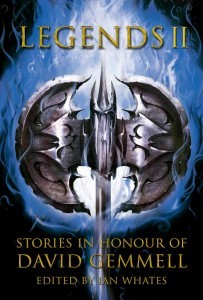 What do you want to say, make the reader think about or feel?
What do you want to say, make the reader think about or feel?
My story The Blessed and the Cursed in Legends 2 contains soldier-priests, brigands and a spectral host of the damned. It is about the justice of violence and the nature of forgiveness.
How does the Story End?
This is a bit more of a personal peccadillo and part of my process, but I almost always decide first how the story ends. For me this is fundamentally wrapped up in answering the first question. If the theme is a discussion on fear, the closing scene or plot point is going to be about fear, either overcoming or succumbing depending on how things go.
Like the first question, this doesn’t have to be about plot or details, though it can be. If your story is about something, that needs to be the last thing you leave with the reader. A story about sacrifice? Whether the act happens at the beginning, middle or end, the parting thought of the reader should be about that moment. You want to write about the effect of the internet on communication? The finale of the story needs to address this issue directly, whether a resolution or open-ended for the reader to decide.
You might almost think of it like the call-to-action. The last word on the subject is literally yours, so make sure you know how you want to use it.
This might well be something very specific. ‘They all lived happily until the end of their days’ completes many fairy tales, but usually sums up the story. Bad things were overcome and happiness prevailed.
Thinks about these:
“He loved Big Brother.”
“The creatures outside looked from pig to man; and from man to pig; and from pig to man again; but already it was impossible to say which was which.”
And my personal favourite, “He drew a deep breath. ‘Well, I’m back,’ he said.”
The first line I ever wrote about the Last Chancers was “Ever been ten strides from death?”. It was that notion that launched the whole thing. Pretty much sums it all up, being part of a suicide mission. I’ve tried to be similarly succinct with the closing lines:
Deliverance –
‘There’s another reason I’ll fight my damnedest, sir!’
He spins around and looks at me, an eyebrow raised in question.
‘I – I ain’t gonna give you the fragging satisfaction of seeing me dead just yet, sir!’
‘I knew you would come back to me, Kage,’ the Colonel purrs savagely. ‘You are one of mine. You always will be. I can kill you now, or I can give you one more Last Chance.
Oh frag.
Liberty –
‘Schaeffer!’ I shriek. ‘Come back here you bastard!’
He caught up with the other man in the small elevator chamber, where a nervous guard stood. When the warden saw the scarred man his eyes widened in surprise and fear. He glanced at the officer in the heavy coat before fixing his gaze on the newly arrived prisoner. The guard gulped heavily, and shuffled nervously back a pace.
The prisoner turned and winked.
‘Don’t worry,’ the man said, a savage grin wrinkling his many scars. ‘I won’t be here forever.’
Now I truly understand what it means to have a Last Chance. I’m glad I finally took it.
(As an aside, I really would like to write more Last Chancers. Ten years ago I was done with Kage and the Colonel, but I miss them now. I don’t think that’s likely though.)
This is getting to the real meat of what a story is. Narrative is nothing more than the resolution of a conflict. That can be quite dull – I needed some bread so I went to the shops and bought bread – or quite exciting – I needed some bread so I fought my way across the wasteland to raid the old bakery.
In Screenwriting 101 Neill D. Hicks identifies the external and internal conflicts as being the pivot of a story. The external conflict is what happens – the aliens to be defeated, the funeral to be attended – but in order to resolve the external conflict an internal conflict must be addressed first. The mismatched cops must learn to live with each other. The main character has to take control of their life, or perhaps let themselves be controlled. Acceptance of self, defiance or acceptance of norms, the breaking of taboos, taking risk or accepting responsibility, these are all internal conflicts that the narrative may require a character to resolve before the plot opposition can be overcome.
The conflict doesn’t have to be quite as deep as that, but it does have to cause problems to the characters beyond a physical obstruction or threat. Ben Counter’s classic Warhammer 40,000 short story Words of Blood is about asking what happens when Black Templars Space Marines face a force dedicated to the Chaos God of War. The Black Templars never retreat. But against an enemy that literally thrives on battle, retreat is the only way to win…
It’s nice to see conflicts used to turn tropes on their head a bit. Subverting or inverting the expectations of the reader might be a theme (going back to question one). Often the maverick cop and by-the-books cop have to do something wacky, because as creatives we want to see independence rewarded. Rarely do we see the maverick have to toe the line in order to get the collar. Or perhaps an epilogue where the case gets thrown out by the judge because the maverick ‘bent the rules’.
Pretty much all of my Dark Angels stories and novels have an underlying conflict of secrecy and lies. Every overt conflict of bad guys to shoot with bolters comes about or is hampered by ten thousand years of internal division and fragmentation of truth. Unfortunately for the Dark Angels, they are simply beyond being able to repair this damage and pretty much bad things continue to happen – a case where they might overcome the overt conflict but make no progress on the inner conflict. With the exception of Angels of Darkness, my first ever Dark Angels novel, which deliberately does the exact opposite, against which later calamities are measured.
Does Anyone Care?
You might have read advice about making sure people care about your protagonist. You don’t have to like them but you have to care about them.
This isn’t that advice, although it is related.
This is about whether people will care about the story. I dearly love my son Sammy, as you expect, and couldn’t care more for his personal happiness and wellbeing. This in no way makes me any more invested in a story about Sammy eating his breakfast. Unless, you know, he did it in an awesome way that was somehow a major milestone for him, like not getting it in his hair.
Think of it like this. If someone else was leading the story would the reader still care? And, conversely, if your character was in another story would people still care? The reader needs to be invested in the character, but also in what the character is doing.
‘Caring’ doesn’t even mean rooting for or supporting. It simply means that the story should affect us beyond the page. Does it confirm or challenge our beliefs or perspective? Is the story related in some way to the world we inhabit, its themes concurrent with what we think and consider when we’re not reading books, or perhaps introducing a concept that we will think about and consider later?
This is especially important if you accept that the vast majority of genre stories – sci-fi, fantasy and horror – are about unreal people doing unreal things in unreal places (often with unreal monsters trying to kill them). If the overt story is fundamentally ‘made up’ the texture underneath has to work hard to make anything relevant.
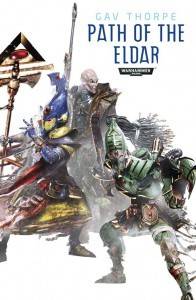 My Path of the Eldar series poses questions about identity – the notion of self and how we are defined by our changing interactions with those around us. In this case the eldar literally reinvent themselves as they go through their lives, either evolving or becoming trapped in one psychological aspect. Wondering how we fit in, how we are viewed by others, and whether we will be able to adapt in a constantly changing world are issues that confront each of us.
My Path of the Eldar series poses questions about identity – the notion of self and how we are defined by our changing interactions with those around us. In this case the eldar literally reinvent themselves as they go through their lives, either evolving or becoming trapped in one psychological aspect. Wondering how we fit in, how we are viewed by others, and whether we will be able to adapt in a constantly changing world are issues that confront each of us.
Being a Good Reader
Other writing advice will tell you to read well. ‘What goes in, comes out’, it says. All true. It is important to identify what we each think of as ‘good’ writing and, if not emulate it, attempt to understand why it works. Often this is applied to the craft side of writing – how did a scene make you feel, what did the use of dialogue or description do, how did the writer convey a particular emotion or action?
It’s equally important to think about the story in these terms. Ask the questions above of what you read as well as what you create. Peeling back the veneer of the language to see the emotional engine underneath will help you translate that feeling you get into your work.
Conversely, never only study success, you should learn from failure too. If you read a story that doesn’t do it for you, work out why. If you’re tempted to give up, try to understand why you don’t care enough to continue. If you enjoy a story but it leaves you with a ‘meh’ feeling, have a think about what could have been done for the ending to have more impact. Remember that a story is made up of both narrative and delivery; separate out which is working or not working for you.
Four questions. Not always simple, but always important. Answer them and you have a story worth writing and worth reading. Then all you have to do is start typing…
I’d be interested to hear about the questions other writers ask to help them focus on a narrative – please use the comments section to share your thoughts and experiences.
**To make sure you don’t miss out on any blog posts, you can keep up-to-date with everything Gav by signing up to my monthly newsletter. As a bonus, every other month I randomly pick a newsletter subscriber to receive a free signed copy of one of my books.**
September 2, 2015
Interview with Fearless Games – August 2015
Listen to me break words with the great guys at Fearless Games, where I talk about how I got into games design at Games Workshop, what it’s like writing for Black Library, and my views on the new Age of Sigmar.
Visit the Fearless Games Youtube Channel here.
August 29, 2015
Game Over Extract
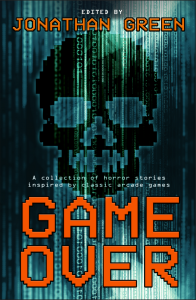 The latest of my short stories is now available. Like all of the stories published in the Game Over anthology, It Was Beauty… is inspired by the arcade games of our youth (well, my youth). No prizes for guessing which game I picked as you will see from the extract below. Let me know in the comments which video game might inspire you to write a story.
The latest of my short stories is now available. Like all of the stories published in the Game Over anthology, It Was Beauty… is inspired by the arcade games of our youth (well, my youth). No prizes for guessing which game I picked as you will see from the extract below. Let me know in the comments which video game might inspire you to write a story.
About Game Over
In the cavern-like darkness of the arcade, the neon phosphor-glow of the screen beckons you close. Drawn to the dancing pixels like a moth to a flame, digging deep in your pocket you pull out a shiny coin and thumb it into the slot as the electronic siren sings the fanfare that marks your arrival. One hand on the joystick, the other splayed across the control buttons, your pulse begins to quicken.
Ready Player One
Press Start
You’ve barely begun but suddenly the discordant bleeps are trumpeting your failure as your 8-bit adventure comes to an abrupt end. At least in the world of the video arcade you get a second chance. But what is the true price you pay when you make a pact with the digital demon? There’s always another coin, an extra life to be earned, a second chance… Isn’t there?
GAME OVER
A dozen stories of creeping dread and savage horror inspired by the humble amusement arcade and the classic coin-ops of yesteryear. Twelve tales to chill your blood by twelve masters of the malevolent and the macabre.
Just keep reminding yourself, it’s only a game… Isn’t it?
Game Over is now available to purchase.
The first review is now on Amazon: “Creepily odd – if you like horror stories with an angle, or you enjoy arcade games, or remember those smelly places – then this is definitely for you.”
How long until Maurice arrived? How long had Marian already been there? He didn’t wear a wristwatch. On the other hand, he wasn’t going to look at his phone. The glow from the screen would be a sure-fire giveaway.
Would Maurice come alone?
The thought that he would not, that he would bring a platoon, a battalion, of General Klump’s soldiers, set a new fear jangling through Marian. What would they do when they arrived? He was just an air-con repairman; he wasn’t meant to know about cybernetically-boosted apes and off-the-books military projects. He probably wasn’t even supposed to know Maurice and Garry.
Where the hell was Pauline?
Movement destroyed all other thought. Uzuri rose from his haunches, two immense hands knuckling onto the lino as he turned.
The storage area exploded with noise. Screeches, wails, snarls, hissing, moans, gibbering and grunts obliterated any chance Marian had to hear the gorilla as Uzuri moved out of view behind a stainless steel bookshelf. Cages rattled, claws manically scratched, teeth scraped along bars in group desperation to be anywhere other than in the room with the modified gorilla.
Leaving? Coming closer?
Marian’s thought processes devolved to little more than survival instinct, the capacity to reason chased away by raw terror. The clamour made nails in his head, driving deep through synapses and ganglia to make even the simplest process painful – almost impossible. His heart, an organ already offended by years of greasy tacos, burger lunches and full cream coffee, was fit to burst in his chest. It screamed at him to use the blood exploding through his body.
Do what? Fight or flight? Fight or flight?
A hairy hand, knuckle-down, appeared at the end of the row of cages, just a few yards from Marian. It was followed by another.
Coming closer.
August 12, 2015
Climbing Yggdrasil – Nine Worlds Event
 (Note from Gav – this is a long one, and link-heavy, but it goes to show just how much can be packed into one weekend at an event!)
(Note from Gav – this is a long one, and link-heavy, but it goes to show just how much can be packed into one weekend at an event!)
One of the pleasures of being a fan of sci-fi, fantasy and horror is that there are plenty of events throughout the year where we can get together to celebrate out mutual interests. Being a gamer, in the UK there are the wargames shows like Salute, Partizan, Hammerhead and the Derby World Wargames, as well as the UK Games Expo and other tabletop gaming gatherings. We can go to ComiCons and other ‘gate’ events where fans meet their favourite stars from TV and film. Events such as Eastercon, Edge-Lit, Fantasycon, Novacon, Bristolcon and other things ending in -con are celebrations of genre literature.
It’s probably because many facets of being a genre fan come together in one place at Nine Worlds Geekfest that it remains my favourite event of the year – coupled with the great people, modern and inclusive outlook and attention to accessibility and diversity. Add so many great attractions, workshops and panels that the most common complaint is that there’s too much to do and you have an unmissable weekend.
Though there were as many things to do this year as previously, across a huge variety of ‘tracks’ we spent most of this year socialising, due to having an active and frequently loud nineteen-month old in tow. Though there were dozens of panels we would have liked to have attended, the reality was that we had to pick just a couple of things each that we didn’t want to miss.
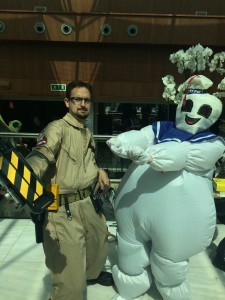
Andy Poulastides as a Ghostbuster, just one of the many great cosplayers in attendance at Nine Worlds.
Writerists Unite!
It’s sometimes mentioned that up-and-coming and aspiring writers should attend events because that’s often where they might see an editor or agent. That is certainly a possibility, but I would say the best thing about going to genre events is that you will definitely spend some time with other writers, some of whom will be in a similar stage of their writing career and others who have had vastly different experiences. Leaving aside advice, panels and networking for a moment (but only for a moment) swapping writing stories, discussing process and simply spending time with other people who have even a small inkling of what’s going on in your head is inspiring and reassuring.
Just thinking about the number of cool people I spent time with over the three-and-a-bit days seems slightly surreal after the event. Some I’ve spoken to before, others I met for the first time. Fellow Black Library author Guy Haley provided constant curmudgeonly, goblinesque entertainment and a willing ear for much of the weekend. Sometimes it was just a passing hello and catch-up, as with Liesl Schwarz, Anne Lyle, Adrian Tchaikovsky, Jen Williams and Danie Ware. I spent quite a bit of time talking to Den Patrick about the Dark Heresy RPG he ran on the Saturday. There were plenty of new acquaintances too, like Johnny Nexus who kindly gave me an ARC (advanced review copy) of his forthcoming genre humour book If Pigs Could Fly, and Dave Moore of Abaddon Books proved to be a dab hand at Sammy-wrangling for which we are very grateful.
I haven’t just run through this list for the sake of name-dropping (not entirely…) but to illustrate that attending events puts you in contact with people. Aside from a few I met via Games Workshop or the Black Library, these are folks that I know now only because of events like Nine Worlds. I can understand why someone like Lee Harris of Tor.com can say that he usually spends all of a convention in the bar just catching up with people.
Saturday night was a blast, the busiest part of the weekend that didn’t involve a toddler. First up, to celebrate the forthcoming release of the Gamer Over anthology there was a tiny flash mob in the bar consisting of me, fellow contributors James Wallis and Jim Swallow, and the editor Jonathan Green. Being the only one whose name does not start with a ‘J’ was awkward but we got past that… In truth I’ve known all three of them for many years now, on and off, and it was great fun catching up with them again (and telling James that I backed the new Paranoia RPG Kickstarter on the basis of his name being attached!).
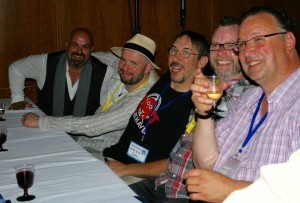 Later that evening was the first time the David Gemmel Awards for Fantasy were held at Nine Worlds. Congratulations to all of the winners, although I was unable to attend the ceremony due to bath and bedtime. Sammy’s, not mine, I hope you understand. Directly following the trophy-giving was the launch of the Legends II anthology from Newcon Press. Editor/ Publisher Ian Whates and I first met at an Angry Robot signing in Sheffield, and again at the Andromeda One event a couple of years ago, at which he asked if I would like to contribute a story. Living proof (albeit anecdotal) that attending events can and does lead to work! Ian is a lovely chap and it was great to meet with the other contributors in attendance. Judging by the speed with which the limited edition hardbacks went on the night, don’t hang about ordering if you want one of the signed editions.
Later that evening was the first time the David Gemmel Awards for Fantasy were held at Nine Worlds. Congratulations to all of the winners, although I was unable to attend the ceremony due to bath and bedtime. Sammy’s, not mine, I hope you understand. Directly following the trophy-giving was the launch of the Legends II anthology from Newcon Press. Editor/ Publisher Ian Whates and I first met at an Angry Robot signing in Sheffield, and again at the Andromeda One event a couple of years ago, at which he asked if I would like to contribute a story. Living proof (albeit anecdotal) that attending events can and does lead to work! Ian is a lovely chap and it was great to meet with the other contributors in attendance. Judging by the speed with which the limited edition hardbacks went on the night, don’t hang about ordering if you want one of the signed editions.
And everyone was nice enough to sign my copy too.
Things I learnt at the signing:Edward Cox is a serial hugger.
John Gwynne has lovely handwriting.
Gavin G. Smith looks disturbingly like Azrael from Dogma but with a beard.
Free wine is almost compulsory at a launch.
And everyone was nice enough to sign my copy too.
The night culminated in games of Exploding Kittens (the most-backed Kickstarter in history) with Kez’s sister Joe, Richard Williams, David Tallerman and Jonathan Green. (Joe won both games, for those keeping track of my many gaming defeats.)
It can be intimidating at your first event (and second, and third, and seventh…) especially as many of us lack social confidence, spend most of our times inside our own heads and may feel shy talking to authors that we’ve been reading and reading about. Looking from the outside there seems to be groups and cliques, by agent, publisher, experience and genre. Once you get in the thick of it, all of that fades away. I can honestly say that when I have actually spoken to other writers I have never felt anything other than welcomed. Look out for ice-breaker type events, often on the evening before the con proper starts. It’s worth getting there early and just hanging out, meeting people before they’re wrapped up in what panel they are on or attending, the activity of the con itself often adding a time pressure with people coming and going. Nine Worlds has specific Newbie Meet-ups wonderfully chaperoned by Emma Newman (who is open about her own social anxieties) and Pete Newman, along with others. Huge thanks to Emma also for staying a bit longer to sign Kez’s copies of her marvellous Split Worlds Trilogy.
Whatever else happens, remember that everyone is there to celebrate what they love. You are not being judged. These are ‘our people’ as Kez and I are fond of saying.
Always Learning
 As well as the general ambience of being around other writer-types, it’s important to use events to expand your thinking – about writing process, themes, craft and the murkier aspect of the publishing industry. Nine Worlds’ different tracks meant there were panels and workshops under the headings of fan fiction, creative writing and All The Books, all of which had useful content. For me (as in previous years) it was the Skeptics and Academia tracks that held the greatest attraction, being that most of my inspiration comes from history and real life.
As well as the general ambience of being around other writer-types, it’s important to use events to expand your thinking – about writing process, themes, craft and the murkier aspect of the publishing industry. Nine Worlds’ different tracks meant there were panels and workshops under the headings of fan fiction, creative writing and All The Books, all of which had useful content. For me (as in previous years) it was the Skeptics and Academia tracks that held the greatest attraction, being that most of my inspiration comes from history and real life.
In the end the only panel I was able to attend was this one:
Rebellion, Outsiders and Group Dynamics: three talks on outsiders and relations to authority
Across these three talks, the speakers explore various ideas of difference and how those differences colour our perceptions of groups outside our own. The first will look at representations of physical and mental disability in the Vorkosigan series and how the series’ protagonist defies the standard template of science-fiction heroes. The second talk will focus on the seminal Judge Dredd story America, and look at gendered attitudes towards and forms of rebellion and interaction with the overwhelmingly white and male authorities of 2000AD. Finally, the series will conclude with a discussion of relationship between “self” and “other” in Battlestar Galactica.
Speakers: Ria Cheyne, Kelly Kanayama, Ro Smith
I missed the start of Ria Chayne’s talk but she did a great job of explaining about not only wider disability issues, both in individual and social terms, but also the Vorkosigan series which I had not heard of. The talk was good on two counts – firstly I want to read Ria’s full paper on the subject, and secondly I need to add a Vorkosigan book to my ‘to-read’ pile.
I found Kelly Kanayama a little less inspiring, I’m afraid, through a combination of a less structured presentation style and a less convincing development of her thesis. The full paper might address these issues, of course. I felt that while her underlying point about two white men writing and drawing about a Hispanic woman’s death was sound, she failed to account for the possibility that much of the bias in the story ‘America’ may have been deliberate, on account of the heavy satire present in Judge Dredd that she acknowledges at the start of the presentation. Even so, it was good to be reminded that as a western, white male writer I shouldn’t ignore how I treat characters and storylines associated with different genders and ethnicities.
Last up was Ro Smith who gave a very confident, polished presentation starting with Hegel’s Master/ Slave Dialectic (which I must admit got a little bit too philosophical for me to understand after a few reflections of ‘self’ and ‘self-consciousness’!) and into representations of that dialectic in the remake of Battlestar Galactica. This was very good, very accessible and well-observed. I want to explore this further as this theme is at the heart of a character I am developing for a new original fantasy series – I zoned out at a couple of points wondering how all of this will play into the narrative.
On a more business-related vector I took part in one of the ‘Monsterclass’ workshops. This was for Marketing, helmed by the very able Jared Shurin (of Pornokitsch, Jurassic London and other interests) and Paul Wiseall (co-founder of Fantasy Faction). We authors don’t often talk about the grubbier side of publishing, like trying to get people to buy and read your books, but there are usually very useful workshops and panels dealing with agents, marketing, editorial process and all that. In this case, Jared and Paul were able to combine theory and practical advice, cramming a lot of stuff into a 60 minute slot. Most of us don’t have a big publisher and their marketing department pushing our wares, and with ebooks, social media and self-publishing constantly on the rise it’s more important than ever that authors understand the importance and disciplines of self-marketing. Rightly or wrongly, most agents and editors today will have to take into account the author’s own marketing punch and ability before signing on the dotted line.
 But marketing needn’t be a drag. Reminding people every now and then that you have a book out is not evil. As a reader I want to know when my favourite authors have something new for me.
But marketing needn’t be a drag. Reminding people every now and then that you have a book out is not evil. As a reader I want to know when my favourite authors have something new for me.
By the way, have I mentioned the (non-limited) hardback of Asurmen: Hand of Asuryan and ebook is now available to pre-order?
Feed the brain and the rest will follow!
Nothing is Perfect
Nine Worlds is brilliant, but it is not perfect. There is a lot going on and it is possible to be struck by ‘choice paralysis’ by everything on offer. Keeping track of where and when everything is can be boggling at times. I highly recommend using the online schedule planner if you are going, just because the track listings in the programme are quite dense.
The venue is nice but, as last year, the staffing levels are inadequate for an event of this size and queues at the bar and poor service throughout breakfast was remarked on by a lot of people. Also, Heathrow really isn’t as accessible as a lot of people think. The organisers are London-based but it would be nice if the event moved to a more Midlands location, possibly a proper convention destination in Birmingham.
Lastly, there seemed to be quite a bit of information that was conveyed online such as alternative lunch provisions (which apparently were stopped by the hotel because nobody used them on the Friday, which I can only assume was because people didn’t realise they were on offer) as well as circulating the (cheaper) convention food menu and reminding folks they qualified for a discount on their drinks. Also signage was better than previous years but still not quite to the required level, particularly when a one-way system was instigated on one of the stairways.
Did these things spoil the occasion? Not at all, but they were definitely irritations in an otherwise highly enjoyable weekend. The good news is that the organisers are very open to feedback. Even the venue might change! If you went, don’t forget to return the feedback survey.
The Haul
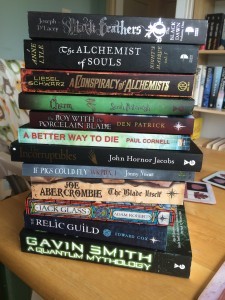 Of course another reason to go to these kinds of events is to spend a bit of money on Shiny Things. The retail experience was much curtailed this year, unfortunately, for reasons undisclosed as far as I know. This is a shame because the dealers’ room at last year’s Nine Worlds event was pretty good, while this year was reduced to a permanent stand for Forbidden Planet and Genki Gear, but for a pop-up market for a few hours on the Sunday for smaller traders, of which there were less than a dozen.
Of course another reason to go to these kinds of events is to spend a bit of money on Shiny Things. The retail experience was much curtailed this year, unfortunately, for reasons undisclosed as far as I know. This is a shame because the dealers’ room at last year’s Nine Worlds event was pretty good, while this year was reduced to a permanent stand for Forbidden Planet and Genki Gear, but for a pop-up market for a few hours on the Sunday for smaller traders, of which there were less than a dozen.
Undeterred, we managed to grab quite a load of books, both free from our gift bags and from the book stand. Faced with the immense choice on display, I plumped for a couple of books by my co-signees from the Legends II event (I’ll pick up a John Gwynne book soon!) while Kez has been steadily trying to read books by authors she has met.
My next big event will be Fantasycon, where I’ll be talking on a panel (more details later – I was also able to meet the schedule organiser Richard Webb at Nine Worlds). Before that I will be at a couple of Angry Robot invasions of Forbidden Planet in Birmingham and London, so stay tuned for news and dates.
Attend events. It’s the LAW!
Take the plunge, you’ll find that you’re one of a massive, happy genre family. If you ever see me at an event some day, be sure to come and say hi. We’re already planning our Nine Worlds trip for next year.**You can keep up-to-date with everything Gav by signing up to my monthly newsletter, and every other month I randomly pick a newsletter subscriber to receive a free signed copy of one of my books. The latest newsletter should be out within the week.**
July 25, 2015
Dark Angels Secrets Revealed!
With the recent releases of The Unforgiven and Lords of Caliban, not to mention the issue of a new edition of Angels of Darkness and a spanking new Codex: Dark Angels, there has been a lot of discussion regarding the secretive Sons of the Lion. I asked fans on Facebook and Twitter what lowdown they wanted on the scions of Caliban.
The following answers are purely my own – reasoning and thoughts I had while working on the novels and short stories. I have not worked in the Games Workshop Design Studio for many years and can’t comment on background directly related in the Codex or what the thought processes of the developers might have been while writing it. Use whatever size grain of salt you feel most comfortable with!
I’ve concentrated on questions most directly related to my Black Library work, but will hopefully write a follow-up post addressing some of the other issues raised.
Mike Hollows – How do you approach writing their characters in a way that is different from other chapters/legions?
At the lower ranks, the un-informed space marines of the regular companies, there is not a lot to differentiate them, except perhaps an even greater emphasis on unswerving loyalty and obedience. As we ascend the levels of knowledge, I wanted to convey the idea that knowing more about the Fallen is a soul-destroying experience, a source of genuine shame and regret that eats at the heart of those that know. Bearing that burden every day, living the lie that must be lived, takes an eventually toll, made all the worse because those loftier positions that are so lauded externally and in other Chapters come with the greatest burdens of truth and responsibility.
At the very pinnacle, Azrael is a highly driven but conflicted individual. Every part of him wants to be the exemplar of the space marines the descendants of the First Legion should be, but those principles are constantly eroded by a decision in which he took no part, yet have handed him the most awful decisions to confront.
Mike Sault – How have your views on the DA changed since when you first wrote Angels of Darkness and now?
 On the whole I would say I’ve become more sympathetic to them. Angels of Darkness is about the realisation of the self-defeating nature of the Hunt for the Fallen, but by the time I wrote The Unforgiven I’d come around to thinking of the terrible consequences of what might happen should the knowledge of that ten thousand-year-old lie come to light. This is explicitly explored in The Unforgiven. Throughout, the theme has been about how the Dark Angels’ own desire for secrecy continually holds them back, and can be used against them to disastrous effect.
On the whole I would say I’ve become more sympathetic to them. Angels of Darkness is about the realisation of the self-defeating nature of the Hunt for the Fallen, but by the time I wrote The Unforgiven I’d come around to thinking of the terrible consequences of what might happen should the knowledge of that ten thousand-year-old lie come to light. This is explicitly explored in The Unforgiven. Throughout, the theme has been about how the Dark Angels’ own desire for secrecy continually holds them back, and can be used against them to disastrous effect.
David Millest – are there plans for new books about how the “true” names of the Dark Angels were chosen and carried on, and then what their original owners did to mean the names have become true names, i.e. the first Naaman, the first Azrael etc?
No plans, in that I have not agreed anything with the Black Library, but that sounds like a cool idea. My take on this is that the names date back to those that remained loyal during the Horus Heresy. It could potentially be confusing for newcomers to get a book about ‘Azrael’ that isn’t the current Azrael, so that might be an issue.
Rob Ashley White – Will you be exploring the dreaded Dreadwing further to their small mention in The Unremembered Empire, and will this link in with that story arc, or talk about them exclusive of that particular setting? Also, will Farith Redloss be making an appearance?
Michael O’Leary – Are you going to be writing the next HH novel focused on the DAs? What are the rest of the Legion up to on the other side of the ruin storm? I love the way you explore the inner thoughts of Characters. Will we get this for the Lion at any point, who has always been a support character in the HH novels so far? Or will his vaunted secretiveness make this an impossible task, even for your good self?
I cannot go into details at the moment, but I have been working on my next Horus Heresy novel, entitled Angels of Caliban. It deals with events on both sides of the Ruinstorm and will indeed look in more detail at the Deathwing, Dreadwing and associated characters. The Lion and Luther are both point-of-view characters.
Tristan Hammond – Are any of the fallen Calibanite Knights? Meaning non-Astartes who were elevated to the legion via surgery and implants but too old to become full space marines.
Yes, there should be – Luther being one of them. But not many, and certainly they would not live as long as a space marine, so unless one got deposited fairly close to the 41st millennium there wouldn’t be many (or any?) alive in the current time.
Dylan JuliusKaesoron Murphy – What are the chances of a Lords of the Space Marines novel(la)? I’d like to see you do one on at least one of the DA. Can we have a Fallen novel, please? (also asked by Daniel Harris.)
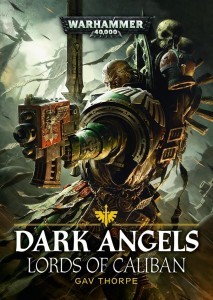 That’s all up to Black Library. I’m going to take a bit of a Dark Angels break for the moment, but further down the line we’ll have to see what happens.
That’s all up to Black Library. I’m going to take a bit of a Dark Angels break for the moment, but further down the line we’ll have to see what happens.
Adam Braddow – Will you ever get a chance to do the lion and the wolf? The fight between El’Johnson and Lemon Russ. (Also asked by David Garneau.)
That’s going to be something that will get covered in forthcoming Horus Heresy titles, but whether I write it or another author hasn’t been decided. I’d like to, but then there are also Raven Guard and Corax storylines to continue, as well as some stuff about Marcus from the Therion Cohort, as well as any number of other threads I’ve left dangling…
Thanks to all that submitted the questions, I will address some more in the not-too-distant future. Remember that you can always get in touch with me on Facebook, Twitter or through the contacts page.
July 22, 2015
Event Report – Edge-Lit 4
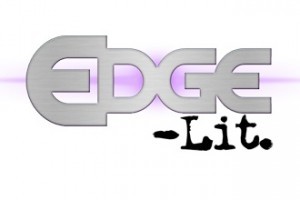 I’ve always enjoyed the Edge-Lit convention, and it’s spiritual predecessor Alt.fiction, for its mingling of fans, professionals and those in-between. My day was a blend of all three of those facets coming together, combining panel appearances, a workshop and a couple of book launches.
I’ve always enjoyed the Edge-Lit convention, and it’s spiritual predecessor Alt.fiction, for its mingling of fans, professionals and those in-between. My day was a blend of all three of those facets coming together, combining panel appearances, a workshop and a couple of book launches.
The panels were stimulating, although I must confess my addition to the Grimdark panel was a little short notice and I could have been better prepped for it. Nonetheless, gamely moderated by Adrian Tchaikovsky we managed to have a look at all that was grim and dark, including a discussion on whether A Song of Ice and Fire is actually grimdark (I contest that it is, even though it has high fantasy trappings such as dragons and kings and stuff), and a great question from the audience about whether it’s possible to write (and sell!) uplifting stories any more.
The second panel, on writing and selling short stories, was timely because it is a subject I have been looking into a lot more lately. I’ve really enjoyed working on some original short fiction this year. As was discussed by the panel (sponsored by Sharkpunk, nod to Jonathan Green whom I had a great chat with between engagements) short stories can be a nice complement to working on novel drafts, allowing you to excise a few ideas that have been nagging away, clearing the palate to concentrate on the larger work. It’s certainly an area I’m looking to do more with, perhaps even some self-publishing a bit further down the line if there seems to be an audience.
If you’re interested in writing and submitting short stories, I often share commissions and submissions opportunities I come across on Facebook and Twitter. This is also a great way to keep an eye out for upcoming publications that you might want to read!
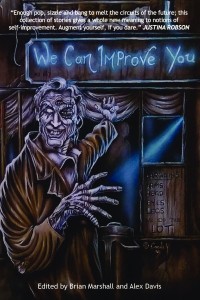 Speaking of which, I did a short reading from Driver Not Found, at the launch of the We Can Improve You anthology. (You can also see an extract in this earlier blog post.) I’m reading my author copy at the moment and there are some very entertaining stories. Writing short fiction has rekindled my love of the form, and given how busy I am these days between work and family, it’s nice to digest my fiction in short, satisfying chunks.
Speaking of which, I did a short reading from Driver Not Found, at the launch of the We Can Improve You anthology. (You can also see an extract in this earlier blog post.) I’m reading my author copy at the moment and there are some very entertaining stories. Writing short fiction has rekindled my love of the form, and given how busy I am these days between work and family, it’s nice to digest my fiction in short, satisfying chunks.
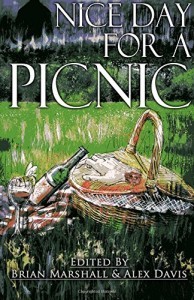 And that’s probably why I ended up ordering a copy of Chip Shop Horrors at the Knightwatch Press launch, even though I was there as one of the author stable for Nice Day for a Picnic. I was also really tempted by Killer Bees from Outer Space, which I’ll probably order later.
And that’s probably why I ended up ordering a copy of Chip Shop Horrors at the Knightwatch Press launch, even though I was there as one of the author stable for Nice Day for a Picnic. I was also really tempted by Killer Bees from Outer Space, which I’ll probably order later.
I was sold on these two books on the basis of the author readings, which goes to show that it really can be worth the time and effort to a) do a reading if you’re an author and b) attend if you’re at an event. The same applies to The Electric, by Andrew David Barker, which I will pick up following his excellent reading at the Boo Books lunchtime launch. It’s as good as an extract for giving you a glimpse into the world and style, with the added bonus that it is literally in the author’s ‘voice’ which adds a particular spin on the words.
The workshop was also a great success it seems, and was well attended. It was aimed towards helping people collate and stretch their inspirations and ideas, combining them together to create unique worlds, characters and stories. It works very well as a group event, and I’ll try to turn it into a written form for a future blog post.
This year Edge.Lit is returning in the winter with Sledge.Lit. I hope to see you there.
July 11, 2015
Short Story Extract – Driver Not Found
Today, Saturday 11th July, I am attending the Edge-lit convention at the Derby Quad. Among my many activities I will be attending the launch of a new anthology from Boo Books, entitled We Can Improve You. It includes my short story Driver Not Found, an excerpt of which is below.
Another twenty-three minutes and fourteen seconds of investigation revealed the anomaly. Last night’s update had erroneously imposed the 3.2.1 driver on his cortical link, which needed 3.2.3. He couldn’t fathom why the download would do such a thing; it was automated direct from Microsoft Neurohub.
Then he caught himself. Of course it was entirely possible that the automatic download was messed up. It was just like the time that it had missed out the version update on his SkyWeb subscription and he’d missed four hours of his favourite sitcom. Then there was the time his location filter had been de-synched and the pizzabot had taken his order to a flat three floors above. Or the time…
He realised that recounting past corporate cock-ups was not going to fix his present situation. All he had to do was rollback the version driver to the last one that had worked. Except, he remembered with a snarl, he had submitted for automatic backup on his downloads after getting bored authorising them every morning when he woke up. There was no rollback driver to install.
Finishing his coffee, Luther tried to work out what he could do. The problem was that he really didn’t have much of a clue about the various implants that were stuffed into his head. He wasn’t a technician, or for that matter much of an educated enthusiast. He’d bought each upgrade and new brain peripheral as they’d come out, just like everybody else. He wished he had paid more attention and at least completed the tutorials.
If anything but the receiver had gone wrong he could have manually reinstalled the data from off the neurohub, but without a connection that was impossible. It was the same thing with hooking up to a helpdesk: no signal, no contact.
The more he thought about it, the angrier Luther became. Of all the things he had hoped to do on his day off, mucking about with his synware was the last. He’d envisaged a morning spent channel-surfing and relaxing in his underpants. He’d also planned to dial up Marko and some of his less-employed friends to see if they fancied spending the afternoon in an Omega Wars 3 group-sesh. Now he was going to spend ages sorting out this mess.
Resisting the urge to hurl his coffee mug across the room, Luther tried to link with his synmail again. It didn’t work. Whatever the solution was, it wasn’t going to be sitting here and hoping the problem might fix itself.
He would have to go out.


